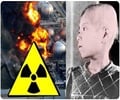Nuclear radiation exposure affects baby gender, and leads to an increase in male births relative to female births.

Ionizing radiation from nuclear activity is known to have mutagenic properties and is therefore likely to have detrimental reproductive effects. It is thought that it may cause men to father more sons and mothers to give birth to more girls.
Scherb and Voigt look at the long-term effects of radiation exposure on sex odds - a unique genetic indicator that may reveal differences in seemingly normal as well as adverse pregnancy outcomes between maternal exposure and paternal exposure.
In particular, they focus on sex odds data with respect to global atmospheric atomic bomb test fallout in Western Europe and the US, fallout due to nuclear accidents in the whole of Europe, and radioactive releases from nuclear facilities under normal operating conditions in Switzerland and Germany.
Taken together these findings show a long-term, dose-dependent impact of radiation exposure on human sex odds, proving cause and effect.
What is less clear is whether this increase in male births relative to female births is the result of a reduced frequency of female births or an increased number of male births.
Advertisement
"Our results contribute to disproving the established and prevailing belief that radiation-induced hereditary effects have yet to be detected in human populations," Scherb and Voigt said.
Advertisement
Their work is published in the June issue of Springer's journal, Environmental Science and Pollution Research.
Source-ANI














